#especially middle aged women and lesbians and woc
Explore tagged Tumblr posts
Text
I canceled my amazon prime subscription because it felt silly throwing monthly money at that horrible bald guy when I try to not even buy products from amazon anymore.
The only show I was watching there was The Wheel of Time and now that I am not watching it anymore it kinda feels like I can finally confess that the show is painfully mid and there were two to three middle aged female characters my interest in the show completely depended on (and one to two others that made everything nicer to watch). I tried to hype myself up a lot for this show but if it was canceled I can't say that I would feel much.
#it IS a show that focusses on a lot of cool women#but some of these women are not that interesting or such intense simps for men#its also all over the place and technically only impressive in small bursts between stuff thats kinda cringe or downright exhaustingto watc#i dont like the writing of the women i like in a lot of parts and i know the source material is much much worse#but “better than the source material” isnt a selling point for someone who has zero interest in the source material in the first place#i like supporting shows that are focussing on women#especially middle aged women and lesbians and woc#but like#thats 13 euros a month if i dont want ads#i cant even watch the new yellowjackets season on there#and that show is also making questionable descisions#i think i am at a point where i just want to watch old lesbian shows and movies lmao
0 notes
Text
The Incredible, Radical Jessica James
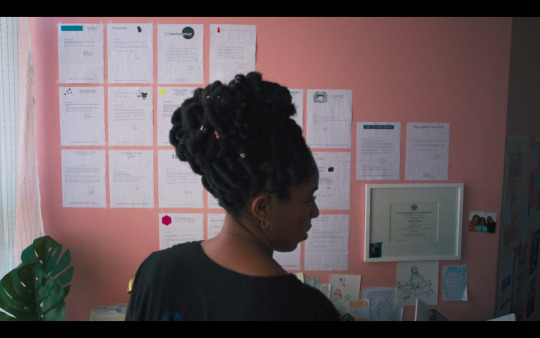
• • • [spoilers below] • • •
In the middle of a blind date she doesn’t particularly want to be on, The Incredible Jessica James’ eponymous heroine squares off with her equally uncomfortable, male dinner friend/potential boyf/adversary.
They volley back and forth several brutally, “completely honest” questions.
After a few, he asks her, “How do you pay your rent?”
“I… work at a non-profit, in Hell’s Kitchen.” (Pride in her voice, though a somewhat knowing tone: yeah, I know. Very Brooklyn answer.) “I teach public school kids how to write and produce their own plays.”
“So… how do you pay your rent?”
She laughs.
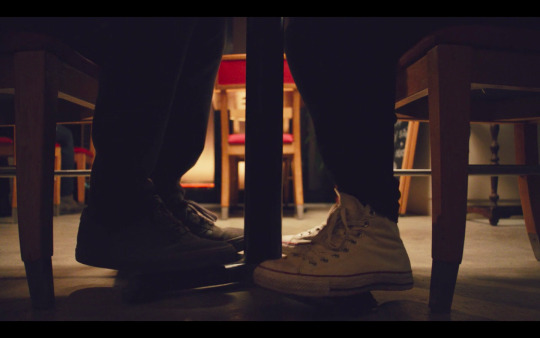
Already – my Netflix ticker says this is barely 13:50 into the entire movie – the two biggest threads of the film come together: (1) an endearing, realistic romantic comedy starring Jessica Williams (that Dope Queen off The Daily Show who now does other stuff – namely, this) and rom-com’s staple dorky everyman Chris O’Dowd (because the thinking, even semi-straight woman[**] needs an IT guy); and (2) the female Bildungsroman.
If you’ve taken an English class any time since approx. 1980, you’ve probably had to learn and use “Bildungsroman” in an essay. It’s the coming-of-age novel, the story of growing up, an arc from innocence to experience. Except, as a pivotal cohort of feminist critics in the 1980s argued, the female Bildungsroman means “growing down,” a story of women being taught by society: Lower Your Expectations! Conform! Settle! The debate around what even is a Bildungsroman has wrestled with how gender-specific a story about maturing and (in essence) #adulting can be, given that women in Western society since the inception of the novel itself haven’t really had the options to leave home, discover themselves as autonomous, free, independent selves. The male Bildungsroman, in other words, is about the boy who grows up to be a man, and gets a job; the female Bildungsroman is about the girl who becomes a lady, and finds the right husband. Sure, there’s status and some freedom attached to that – class status and thus economic freedom, as the bourgieness of the novel excels at rewarding. But by and large, no matter how failed the male career, no matter how much the woman takes on a new career of domestic labor, the novels usually emphasize along these lines. Men achieve professional success; women aren’t left to be spinsters.
(A professor in my department, Jesse Rosenthal, pointed out how pervasive this narrative still is within even the most indie, “unconventional” of tales. His case study? (500) Days of Summer. As he recounted to a class on the 19th-cen. British novel, here’s a movie putatively about the romantic maturation of the male subject – a rom-com trajectory usually reserved for women [i.e.. He’s Just Not That Into You could never be She’s Just Not That Into You]. But Joseph Gordon Levitt’s problematic-nice-guy fairy tale, complete with problematic-indie-dream-girl Zooey Deschanel, isn’t his acceptance of a limited role in his next relationship. It’s a successful job interview. [roll credits])

So the fact that The Incredible Jessica James coupled, in several senses, these two plots wasn’t surprising to me. Less than 15 minutes in, and yeah, obviously, Chris O’Dowd is gonna get the girl, and Jessica is gonna get over her ex by realizing that she “deserves” this more mature guy. Her work is great and all, the story goes, but obviously what we want is Bridesmaids with a lady of color. Comedy + late capitalism’s precarity (Jessica, how do you pay your rent? Are you going to have to go live with your parents like Kristin Wiig had to after the cupcake biz tanked?) = love story. And bonus points for being about Instagram, and having a WOC lead where a white actress would have been five or ten years ago (slash even now): kudos, my friends. Kudos.
But… that’s not what happened. And here’s where this movie is radical.
Because The Incredible Jessica James is a female Bildungsroman [or Bildungs-Film] that subtly, cannily, definitively breaks the mold.
It isn’t a story about a woman realizing how wrong she is to be hung up on the wrong, bad boy, and thus the return to the family, to society’s right side of the tracks, to *herself* that is made whole again by giving up her rebellious adolescent wandering and waffling. Instead, TIJJ presents a heroine who goes through a series of rejections not of lovers, but of jobs [displayed on her wall: see first screencap]. It tracks her indefatigable efforts to make what she loves (theater) into a career, even a somewhat uncertain one. It’s about her slow realization – not the sudden “awakening” narrative that critics have ascribed to female/feminist Bildungsroman of old – that what she’s doing, working every day with kids, continuing to send out her resume, writing and reading and connecting with the public circles of her aspiring field – all that, is a career.
Take, for example, a crucial marker of James’s acceptance of herself, and of her status, as grown-up, matured, sufficiently adult that she’s no longer faking it til she makes it: she’s Made It. The blueish-purple jumpsuit spotted in a Brooklyn consignment shop, the kind that is explicitly labeled as male by the sewn patch of its previous owner, “Randolph,” tall enough for even the pretty tall JJ.

Working-class, second hand, male-identified uniform; natural hair in box braids; red lipstick and bright eyeliner. This is how Jessica meets her parents. But the music slides to an uncomfortable stop as Jessica gets off the Arrivals moving walkway: her parents are bourgie, sweet, stable, and utterly unlike her in spirit. This is the American middle-class dream – as authors from Frantz Fanon to Paul Gilroy to Ta Nehisi-Coates have written – that preys on Black people specifically, the double-consciousness of passing as it works in all its formulaic vapidity. Jessica’s younger sister, too, has bought into this dream: she takes one look at Jessica.
“You look like an auto-mechanic,” Jerusa (her sister) points out in a tone dripping with judgment.
“It’s cool, though, right?” Jessica beams.
“Yeah…” her sister nods, meaning the opposite. “I mean, you’re not going to wear it to the party?” [Her very normative, unironic, and uncritical baby shower.]
“… Nope,” Jessica deflates. Pretending this has been her plan all along.
Because this family isn’t ever going to be the place where Jessica can be anything other than stifled. The prim-and-proper group sits in the suburban family room late that night, merrily gooey-eyed over a romantic drama they’re watching on TV, whose dialogue (that’s all we overhear) is so utterly, sickeningly banal that Jessica doesn’t even enter the room. She hangs back, in the darkness. The entire setting – with all its race and class implications (and the sincere and moving subplot about the James family’s struggles with making their own rent, and how this continues to the present with Jessica’s public school kid whose divorced parents are fighting over custody, intertwines class and race throughout) – requires, in sum, the painful subjugation of Jessica’s self. A “growing down,” a compromise, as its definition of “growing up.”
Women of traditional Bildungsromane, Abel, Hirsch and Langland posit, “are not free to explore; more frequently, they merely exchange one domestic sphere for another. While the young hero roams through the city, the young heroine strolls down the country lane” (8).
Jessica James, by contrast, goes back to New York.
And back, at least superficially, to the romantic sphere of this rom-com. Where her jumpsuit is acceptable; where people like her appreciate thoughtful, empowering arts (instead of, like her mom’s Very White Book Club Lady friend wants, Cats). Where her lesbian best friend (that actress from Master of None) is the elective community James wants, not the family she’s contractually obliged to recognize in her blood. Where Chris O’Dowd is; where her career is.
So how does the movie wrap up the romantic plot without making this about Jessica’s successful “deserving” of the Right Man™?
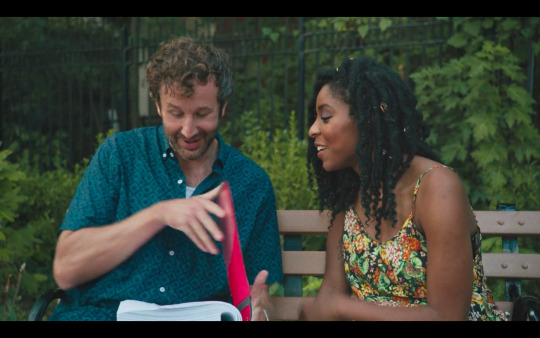
(It’s worth noting, before we spoil the ending, that the Boone – aka O’Dowd – subplot of the movie focuses on his not being able to get over the right girl. He stalks his ex-wife, amusingly because it’s Chris O’Dowd, but I think the movie implies cringe-worthily and creepily too: the dude side of rom-coms, it seems, is bleak; not somewhere the film is especially interested in lingering, and neither really are we. He’s eventually ashamed of himself, and this humility is deliberately more endearing than his Every Breath You Take enactment was. Admittedly, we could get into the politics of who says they’re sorry at various points in the film, who asks for and who gives forgiveness, and the ways in which being placed in a position of forgiving is, in a way, simultaneously powerful and powerless. But Nietzsche and feminism is a debate for another time.)
What I’m especially struck by – and I’ve watched this movie myself and with my sister, and then thought about it again after it was praised by another woman I love who watched it an ocean away – is that TIJJ ends with Jessica.
The final two scenes are crucial here. The penultimate brings together the two guys; formally, the two choices of a Bildungsroman: forward, or back? Jessica’s ex, Damon, finds her backstage after the kids’ theater night concludes, and opens with how he “know[s] how much this means to” her. For a split second, I panicked: OH GOD, fuck, this is why we can’t have nice things. They’re gonna have this guy realize how great she is – because obviously the only way a guy can appreciate a woman is for him to be in competition with another man. She deserves better! I shouted internally. Don’t take him back: sure, you realized you were as responsible for the break-up as he was. So what! You can do better.
But they hug, they sigh, and he leaves. (At which point I breathed a sigh of relief.)
Enter Chris O’Dowd. (At which point I was back to, fuck conventionality. What a missed opportunity.)
Turns out, though, the movie saw me – and the Bildungsroman – coming a mile off.
Because Jessica – unlike Rachel – gets on the damn plane.
Jessica, after all, has been offered a huge job opportunity in the most novelistic of cities: London. But things are just getting back on track with Right Guy; but going is her dream, is her big break; but he, like Damon, just realized how great she is – he read her entire corpus of theatrical writing, and declared – #honesty – that he’s still coming to grips with her complexity, on the page and off; but; but; but…
But… she forgot to tell him about London. And in a sense, this is where swelling crescendos of orchestral joy began filling my head, because if this had been a rom-com like the others, if this had been a female coming-of-age story like the others, she would never forgotten about him. Ever. Not once. He would have been her one phone call; her best friend-par-excellence; her Person. Instead, that honor goes to Tasha, the semi-parodic self-involved best friend who always, though, has Jessica’s back.
And so when the clearly wealthy – loaded, because of an app that is explicitly about the formal gesture afforded by technology of Family, without the actual emotional or affective labor of having to talk to those totally different people who somehow raised you! – Boone mentions “frequent flyer miles,” we can anticipate an airplane that Jessica (by now we can say, of course) will be on.
“Just if you wanted to… bring someone with you… to show you around the town,” he hedges, just before the cut.
“How does that work? [...] Frequent flyer miles?”
Cut to Jessica – in the god. damn. JUMPSUIT. Pleased as punch, sitting in – oh yes, we can have nice things – not even economy seats. The nice seats.

At which point, the truly INCREDIBLE part of this movie becomes clear:
Tasha: Dude, I can't believe your boyfriend bought us tickets to London.
Jessica: Okay, who said anything about him being my boyfriend?
T: Wait. What are you talking about? This is like, the most romantic gesture I have ever seen.
JJ: Yeah, it's dope. But it takes more than a couple of roundtrip tickets to London for somebody to be my boyf.
T: That is so boss.
Shandra – the elementary school girl whose divorced parents prompted Jessica’s own reflection on her parents/childhood – returning to her seat: What is so boss?
T: Uh, Jessica.
S: Oh, yeah. Duh.[… I]t was really cool of your boyfriend to get me a ticket, too.
T: Hey, whoa, whoa, whoa. Sister. Just because a guy buys a lady a couple of roundtrip tickets to London does not make him her boyfriend.…
[a beat]
S: You know, I like your jumpsuit.
JJ: Thank you. Yeah, it's pretty bad-ass, right?
S: Hm. Yeah, it is.
They all exchange smiles, the camera zooms in for one final-close up of Jessica’s excited anticipation of landing for the beginning of – not her romance, but – her career.
COME ON! You’re telling me the final scene of this movie is a new affinity, a new definition of family, in which the white, straight, married couple form is reshaped into the female solidarity of friendship, while the child of that hetero dyad of yore is now the dark-skinned girl who herself is a budding author, having been mentored by Jessica, who is – onscreen – mentored by another strong, Black female playwright??? You’re telling me that throw-away moment in the corridor backstage with Chris O’Dowd that seems like the lead-in to a kiss is in fact his last appearance onscreen??? You’re telling me the movie, moreover, goes out of its way to stress – TWICE -- that whatever erotic/romantic relationship they’re in, Jessica didn’t accept this trip as the quid pro quo of settling down??? YOU’RE TELLING ME THIS NEW COLLECTIVE IS SO AWARE OF ITS MEMBERS’ QUIRKS AND FOIBLES AND SELF-AUTHORSHIP/FASHIONING THAT THE FINAL LINES OF THE MOVIE UNDERSCORE THAT JESSICA CAN, IN FACT, DRESS HOWEVER THE FUCK SHE WANTS, AND THAT SOME PEOPLE WILL LOVE HER FOR IT, AND FEEL THE SAME ABOUT THE THINGS SHE LOVES???
Get out of my face, TIJJ. You have *EXPLODED* the female Bildungsroman, and maybe the Bildungsroman full-stop. There is no return to the original society, no compromise, no settling. Jessica isn’t the one forced to the margins of the story by choosing either independence or submission: the family is.
For that matter, romance sort of is. Jessica has no “boyf”; Tasha has no (onscreen, stable, couple-form) gf, but neither is she a hypersexualized lerb. She masturbates on/off-screen, but it’s one of her quirks! She and Jessica go to a lesbian bar, where Tasha chats with several recognizably-styled queer ladies: but she is neither reduced to her own romance plot, nor denied any sexuality at all. She and Jessica, however queerly you read their relationship (and I don’t especially, but I see how one could), are the empowering couple of the film, supporting each other not just in romance but in their mutually-reinforcing careers.
This is a rom-com about aiming high, about finding a career not in, because of, or in spite of a guy, but because it’s the one through-line of the entire story. Jessica begins and ends loving her work, and the slow build of that love rewards her by the end. She has Made It. The fact that she probably goes home to an attractive dude who boosts but is not himself responsible for her career – sure, he gets her upgraded tickets, but her confidence, “forthright[ness],” and drive suggest she would have made it to London without him, no question, by whatever means necessary – is icing on the cake. Yes, there was a maturation narrative within the romantic plot (she learned to leap in her relationships; she also learned, as Boone did, to have realistic expectations of where both partners are at any given moment in a relationship). But this, the movie stresses, is not the end of the story. It’s a subplot within her story.
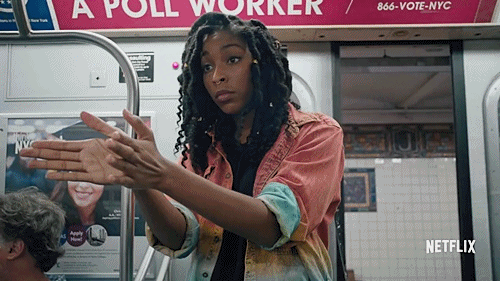
[gif from x]
I don’t think it’s unimportant, either, that Jessica Williams – a fine actress in this movie, entirely winning the screen – plays the heroine. By which I mean, I think it’s all the more radical that to play the romantic interest to gaze adoringly at rom-com’s Irish nerdboy Chris O’Dowd, the director/producers/writers picked a woman whose best-known appearances are in scathing condemnations of male privilege, white supremacy, and American patriarchal, racist, and just terrible norms in general. That such a woman is the new face – but I didn’t even get to talk about the fact that in a few scenes, Jessica J/W’s complexion is a little spotty, which made me (with a long history of struggling with the medical and psychological reality of being a teenager and then adult woman with terrible acne) want to cry with gratitude: this is what a heroine looks like?
Sure, Wonder Woman is fab, but damn I needed this representation so much – maybe more – than the superheroic, impervious demi-goddess from Themyscira. I needed a strong, self-loving, no-nonsense, tall, Black, not-quite-starving artist in Brooklyn, jamming with headphones in the concrete stairwell of her building, who proudly declares, “I’m freakin’ DOPE.”
I needed a new female coming-of-age story – especially in 2017 –, and, somewhat subtly but unquestionably, The Incredible Jessica James delivered.
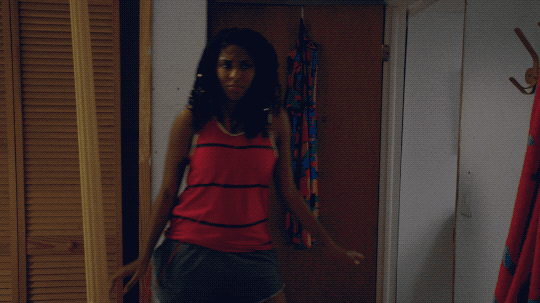
***
{** I use “women,” “men,” “male,” and “female” throughout this piece to refer mostly to the historical categories of those identities/concepts. I also want to be clear that I’m not trying to gloss over this film’s missteps; rather, I’m trying to celebrate its major, but possibly missable, wins. Lastly, I know that in German Bildungsroman means *novel* of development/maturation, not *film*. Don’t @ me.
Thanks to Jesse Rosenthal (JHU) for getting me thinking about the basic understanding of the Bildungsroman in such concise, formal terms. For the debate about male vs./and female Bildungsromane, see – to name just some –, Abel, Hirsch and Langland (eds.), The Voyage In: Fictions of Female Development (1983); Lorna Ellis, Appearing to Diminish: Female Development and the British Bildungsroman, 1750-1850 (1999); Rita Felski, Beyond Feminist Aesthetics: Feminist Literature and Social Change (1989); Franco Moretti, The Way of the World: The Bildungsroman in European Culture (1987); and Susan Fraiman, Unbecoming Women: British Women Writers and the Novel of Development (1993).
The Incredible Jessica James (2017), dir. and writer Jim Strouse; produced by Beachside Films/Netflix. S/o to casting, Kate Geller and Jessica Kelly. Thanks also to Springfield! Springfield! movie scripts for their transcription, which saved me time. }
#The Incredible Jessica James#Bildungsroman#women#coming of age#work#race#class#feminism#Jessica Williams#novel of development#narrative#films#movies#2017#mine#long read#female bildungsroman#heroine
7 notes
·
View notes
Text
Rebel Mariposa. Image via http://www.vivalabotanica.com
Xica Nation recently had the pleasure of interviewing Rebel Mariposa of San Antonio, Texas for a special two-part series about her powerful culinary and artistic community work.
Part I: La Botanica
Part II: “Aqui Estamos y No Nos Vamos” art show
Rebeca “Rebel Mariposa” is a self-identified queer Tejana living in San Antonio, Texas who is trailblazing conscious, cultura, and the arts in her own unique way. She is the chef and owner of the highly acclaimed La Botanica and is also a curator, artivist, and dancer.
Part I: La Botanica
Via La Botanica’s website:
“Given our incredible history and culture here in Tejas, our food embodies the rich traditions of TexMex, Gulf Coast, New Mexican and Mexican cuisine. Our food and drinks have been designed around accessible and seasonal ingredients. But more than an eatery, La Botanica aims to be a gathering place for an eclectic beloved community.
“Edible gardens in our sizable wrap-around yard supply fresh veggies and herbs for our kitchen, serving as an accessible laboratory for those wanting to learn to grow their own food. We also have film screenings and live music on our lovely patio, regular installations by local artists, cooking and gardening classes, and benefits for to raise funds for movements that advance social justice.”
What is your current position and/or project?
I own and run La Botanica Texas’ first vegan restaurant with a full bar, a community venue (and recently voted one of the best lesbian bars and runner up for best vegetarian in SA by the San Antonio Current.)
What is the story behind the famous La Botanica? Where did the vision begin?
La Botanica. Image via http://www.vivalabotanica.com
There was no direct vision for La Botanica it was something that was destined to happen from I guess day one of my existence or perhaps even further back. I come from a line of self starters, self employed, husting familia. Farmworkers, curandera/midwife, artists, activists. I spent my working life doing all sorts of jobs and when La Botanica opened it all made sense, my journey to get me to that moment. It was a great and satisfying feeling. I don’t know where I will go from here but I know La Botanica was meant to exist and I am grateful for the other 3 co-owners for presenting the opportunity for it to unfold and exist. Also extremely grateful to work with such a great staff. the staff is what really makes La Botanica so great. It takes a village, it’s the bands, djs, customers that also make La Botanica what it is. All of that mixed together makes magic.
Were there any challenges as La Botanica manifested?
Por supuesto! Brown, queer women run business, oh and with a vegan menu in Texas! I would and still tell my staff sometimes “against all the odds, we are here and we are making it.” When I first moved back I would say most people I talked to didn’t know what vegan was, they assumed it was vegetarian, that has changed a lot in the past 3 years.
What has the response been?
In the beginning we got lots of not so great feedback, we were thrown in the deep end and learning to swim in front of an audience. Lots of critiques and and doubts pero now two years later we are going beyond just staying afloat we are actually swimming. We still have a ways to go to get to an island and take a rest but I am grateful for each day.
What are some of the top selling menu items?
#gallery-0-5 { margin: auto; } #gallery-0-5 .gallery-item { float: left; margin-top: 10px; text-align: center; width: 33%; } #gallery-0-5 img { border: 2px solid #cfcfcf; } #gallery-0-5 .gallery-caption { margin-left: 0; } /* see gallery_shortcode() in wp-includes/media.php */
Do you have any upcoming events/projects?
We are also turning 2 this June. We got a our 2nd annual love fest prom happening in June too!
How can people connect with you and/or support?
La Botanica is located at 2911 N St. Mary’s St., SATX 78212. Come eat, drink, dance with us! We are also available for catering and La B can be rented for private events.
We are on all the social media sites, follow us and like us. Subscribe to our email newsletter: http://eepurl.com/cGOs_P
Website: http://www.vivalabotanica.com
Part II: “Aqui Estamos y No Nos Vamos” art show
Was there a particular moment in your life when you felt called to focus on questions of: identity, gender, and/or decolonization in your life’s work?
At different stages in my life, as I evolve as I experience different isms and I am called to do that work. For example when I was in 8th grade we moved to the north side of town. I was attending Tafolla Middle school, that is in the heart of westside-raza, so when I attend a middle school on the northside I had never seen that many white people in one place, the classrooms. The cafeteria, the parents, etc. I was thrown for a loop so I turned to writing, I wrote a poem about walking and feet and shadows and how both shadows no matter the color of the skin of the person are the same color. So I have had several moments like those in my lifetime where my world shifts & I see things thru a new lens and I create work around that awareness. Art is always how I have dealt with paradigm shifts, moments of shock and awe, pain, anger and joys.
Via the event FB page:
Aquí Estamos Y No Nos Vamos, highlights the resistance, solidarity, anger, hope, and healing women of color are experiencing in response to the abusive and oppressive rhetoric that is/was disseminated during Trump’s campaign and carried on into his presidency. The art speaks to a transformation of a social or personal strife that translates into piercing visions of the present and a futuro con Esperanza. The artists featured in this exhibit believe that art must address the abuse on our bodies, communities, and lands.
ABOUT THE ARTISTS: The women of color artists featured in this exhibit are working class, immigrant, queer, and create artwork ranging from traditional visual art to sound art to sculpture to textile and much more.
What are some things that you have learned on your journey along the intersections of identity/multiple marginality/health/decolonization?
Everyone has an important and an unique story to tell. Each version a thread in the weave of life. We have so much internal work to do ourselves, so much healing that will take generations. I am turning 37 soon and I am definitely less prejudiced & colonized, than I was at 27 but I am still deconstructing, learning everyday how to be a better human to myself, others and this planet. It’s a life work/journey. I feel like I am smack in the middle of my life and I have come so far but it’s only half of the journey – what will come of the other half? Vamos a ver.
What is the story behind the “Aqui Estamos Y No Nos Vamos” art show?
Representation. We have been here for hundreds of years and we aren’t leaving or being intimidated by a white man, please they been trying to do that to women of color for centuries and mira we haven’t gone anywhere if anything we are getting stronger. I see it in women of all ages there is a strength that is emerging from deep within that is unstoppable.
Click on the image to download the official PDF.
What has the community response been like?
People love the exhibit. I am very humbled by all the positive responses. This show was not easy to take on for me or the mini curators, as like to call them all though after this show they are no longer mini. Eliza Perez and Jess Gonzalez and I were all going through personal things in our lives on top of huge work loads and then we took on the responsibility of doing a political driven women of color exhibit, nombre it was exhausting and emotional but also nurturing and healing. Also the best response for me is that the artists in the exhibit are happy with the show. It’s not easy pleasing artists and especially that many.
How can people support this project?
WOC start and keep making art 🙂
I am currently assisting Sarah Castillo with her upcoming NALAC exhibit, and working with Julysa Sosa on her first show in September through lady base gallery, also got some san antonio public art stuff in the works… http://www.ladybasegallery.com/ and in March 2018 Eliza, Jess and I will be teaming up again to curate the Shttps://www.instagram.com/julysasosaphoto/ society for the study of Gloria Anzaldua exhibit in San Antonio location:TBD
http://www.gloriaanzaldua.com/?page_id=4
San Antonio’s “Rebel Mariposa” of La Botanica on the power of cultura, food, and art Xica Nation recently had the pleasure of interviewing Rebel Mariposa of San Antonio, Texas for a special two-part series about her powerful culinary and artistic community work.
0 notes